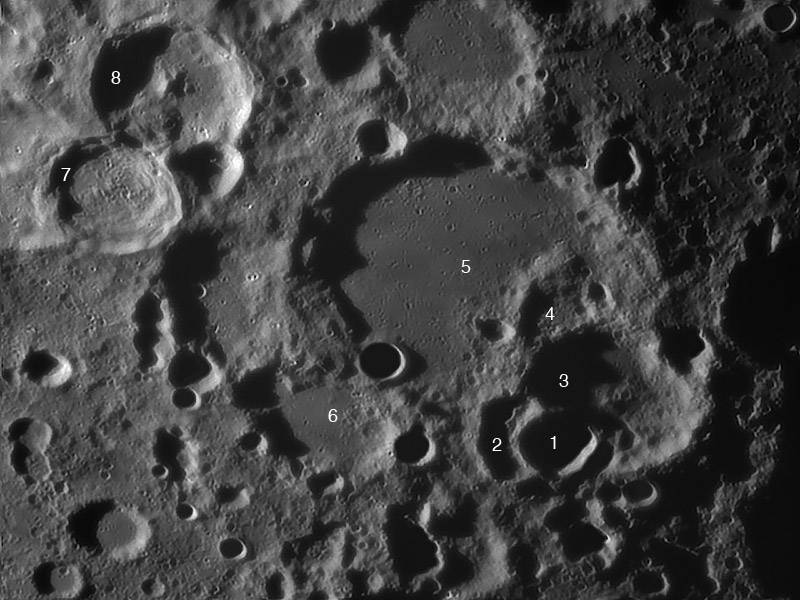
image by Bob Pilz
The lunar highlands are stuffed with craters. But how many generations can you see? In Bob’s excellent image of the Stöfler area, the youngest or topmost crater in the pile on Stöfler is Faraday C (labeled 1). This crater is on top of Faraday P (2), which impacted on the rim of Faraday itself (3). Faraday cut into an unnamed crater (4) that had formed on the floor of Stöfler (5). As an aside, note the bizarrely wide northern rim of crater 4. Stöfler itself seems to have overlapped two pre-existing craters (6 and the unlabeled one of similar size to the left). The sequence 1, 2, 3 and 5 illustrates the common difference in crater sizes through time - earlier craters tend to be larger than smaller ones, because there were more large projectiles early in lunar history. The fact that 6 is smaller than 5, and 4 is smaller than 3, points out that small craters formed all the time, but many get completely destroyed by later bigger ones - we see these ears that were overlapped, not overwhelmed. Changing the topic - look at the little bump just above the number 6. Smooth hills are uncommon in the highlands - it would be very exciting if this were a dome because there is little direct evidence for highlands volcanism. The Lunar Orbiter IV image tantilizingly suggests that the little hill may have a summit pit. This tiny feature requires further study. Finally, look how the formation of Nasireddin (7) caused a huge landslide onto the floor of Miller (8) - its amazing that this doesn’t happen more often.
Technical Details:
2007/09/03, Utime: ~09:49. 200mm f/6 Newtonian reflector, DMK 21BF04 B/W camera. Processed in Registax V4, PS CS, Focus Magic. Taken from Lat: 35 degrees 36 minutes N, Long: 82 degrees 33 minutes W, Elev: ~850m.
Related Links:
Rükl charts 65 & 66
Bob’s image without numbers.
Bob’s website
Yesterday's LPOD: Good Night Moon
Tomorrow's LPOD: Tycho's Projectile
COMMENTS?
Register, Log in, and join in the comments.



